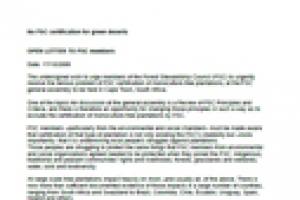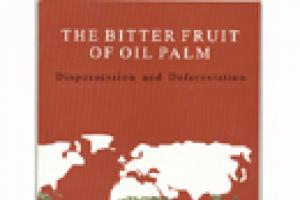Soap, lipsticks, chocolate or perfumes are difficult to perceive as products associated to deforestation and human rights abuses in the tropics. However, this can easily be the case when one of their components is palm oil, though few people outside the plantation areas are aware about this.
The first aim of this book is thus to highlight the impacts associated with large-scale oil palm plantations by providing a general overview of the problem and a broad range of country-level situations, ranging from articles to detailed case studies in Africa, Asia and Latin America.
Large-Scale Tree Plantations
Industrial tree plantations are large-scale, intensively managed, even-aged monocultures, involving vast areas of fertile land under the control of plantation companies. Management of plantations involves the use of huge amounts of water as well as agrochemicals—which harm humans, and plants and animals in the plantations and surrounding areas.
Other information
4 September 2001
This book includes a selection of articles published in the World Rainforest Movement's (WRM) Bulletin on the issue of Forest Stewardship Council certification of tree plantations.
Bulletin articles
11 August 2001
Transnational corporations are increasingly dominating all economic sectors where profits can be made. Most of them have incorporated social and environmental concerns to their discourse, though few of them actually comply with their own declarations in this respect. Regardless of their good intentions, the sheer scale of their operations make environmental sustainability practically impossible, while competition to dominate global markets has made social concerns almost antagonistic to profitability.
Bulletin articles
11 August 2001
The Republic of Congo, often referred to as Congo-Brazzaville, has a total area of 342,000 sq. km, 60% of which is covered by rainforests (21.5 million hectares), mainly located in the scarcely-populated north of the country. The forest and its resources are the main source of livelihood for most of the rural population living there.
Bulletin articles
11 August 2001
In spite of the potentially devastating impacts it might entail, Japanese paper manufacturers are carrying out research on genetic engineering aimed at the "creation" of trees yielding more cellulose.
Bulletin articles
11 August 2001
The process to review, discuss and improve the Malaysian Criteria, Indicators, Activities and Standards of Performance (MC&I) for Forest Management Certification has been subject to disapproval by several Malaysian non-governmental, community based and indigenous peoples' organisations. Though they have been part to the process, they have decided now to withdraw on the grounds that their participation has been somewhat constrained and misconstrued as giving consent and approval to the present MC&I.
Bulletin articles
11 August 2001
Few people know that the Southern US is currently the largest wood and paper producing region in the world. Successful efforts to protect the last remnants of old growth forests in the Pacific Northwest, resulted in the expansion of the industry into the recovering second-growth forests of the South. In the last 10 years, more than 100 industrial-scale wood-chipping facilities have been constructed in this region, while paper production alone has increased by one-third since 1985. Approximately 5 million acres of forests are clearcut every year in the region for paper.
Bulletin articles
11 August 2001
What is happening in Espirito Santo --one of the smallest Brazilian states-- is historic. Mighty plantation and pulp company Aracruz Celulose has generated so much opposition stemming from its activities, that the state Parliament recently passed --almost unanimously-- a law banning further planting of eucalyptus until an agro-ecological mapping of the state is put in place, which will define where eucalyptus can and cannot be planted. The law was immediately vetoed --during a "solemn session"-- by the Governor and now Parliament must decide whether to lift or maintain the veto.
Bulletin articles
11 August 2001
CDC Capital Partners is a major actor in Papua New Guinea’s oil palm plantations. A former UK foreign aid programme, it later became a public private company and invests in PNG through Pacific Rim Plantations Ltd., holding 76% of its shares.
Pacific Rim Plantations Ltd. owns and manages about 23,000 hectares of oil palm plantations in three locations: Northern Province (Popondetta), Milne Bay Province (Alotau) on PNG’s north coast and at Kavieng on New Ireland island. It operates in joint venture with the PNG government, which has a 20% stake.
Publications
9 August 2001
Given the widely ignored impacts of oil palm plantations and their widespread promotion throughout the tropics, the World Rainforest Movement decided to bring together research and local struggles in a book aimed as a tool for action. Given that the problem is present in Africa, Asia and Latin America, we chose three representative cases for each continent: Cameroon, Ecuador and Indonesia.
Bulletin articles
12 July 2001
The news have reached the entire world: the Kyoto Protocol has been saved! In spite of this information being formally true, it hides the fact that this does not mean that the planet's climate has been saved, which is the real issue at stake. On the contrary, as it now stands, while not solving the problem it was intended to address, the Kyoto Protocol will impose further impacts on local people through the implementation of carbon sink projects.
Bulletin articles
12 July 2001
Environmental and human rights organizations have recently sent an open letter to Danish timber trade corporation Dalhoff Larsen & Horneman A/S (DLH Group), calling it to stop dealing with Liberian logging companies which, besides being responsible for the serious process of deforestation that has been occurring during the last decade in Liberia, have been also found involved --according to a United Nations report-- in a number of illegal activities both in Liberia and in neighbouring Sierra Leone.


